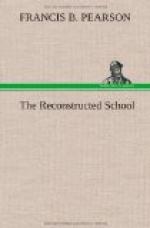It is one thing to know facts but quite another thing to know the significance of facts. And imagination is the alembic that discovers the significance of the facts. A thousand men of England knew the facts touching the life and education of the children of that country, but the facts remained mere facts until the imagination of Dickens interpreted them and thus emancipated childhood from the thralldom of ignorance and cruelty. A thousand men knew the fact touching the steam that issues from the tea-kettle, but not until Watts discovered the significance of the fact did the tea-kettle become the precursor of the steam-engine that has transformed civilization. It required the imagination of Newton to interpret the falling of the apple and to cause this simple, common fact to lead on to the discovery of the great truth of gravitation. Had Galileo lacked imagination, the chandelier might have kept on swinging but the discovery of the rotation of the earth would certainly have been postponed.
In this view of the matter we can see one of the weaknesses of some of the work in our colleges as well as in other schools. The teachers are fertile in arriving at facts, but seem to think their tasks completed with these discoveries and so proclaim the discovery of facts to be education. It matters not that the facts are devoid of significance to their students, they simply proceed to the discovery of more facts. They combine two or more substances in a test-tube and thus produce a new substance. This fact is solemnly inscribed in a notebook and the incident is closed. But the student who has imagination and industry inquires “What then?” and proceeds with investigations on his own initiative that result in a positive boon to humanity. Imagination takes the facts and makes something of them, while the college teacher has disclosed his inability to cope with his own students in fields that only imagination can render productive.
To quote Henderson once again: “In most of our current education, instead of cultivating so valuable a quality, we have stupidly done all that we can to suppress it. We have not sufficiently studied the actual boy before us to find out what he is up to, and what end he has in mind. On the contrary, we proclaim, with curious indifference, some end of our own devising, and with what really amounts to spiritual brutality, we try to drive him towards it. We do this, we irresponsible parents and teachers, because we ourselves lack imagination, and do not see that we are blunting, instead of sharpening, our human tool. Yet we define education in terms of imagination when we say that education is the unfolding and perfecting of the human spirit; or, that education is a setting-up in the heart of the child of a moral and aesthetic revelation of the universe; for the human spirit which we are trying to establish is not a fact, but a gracious possibility of the future.”




